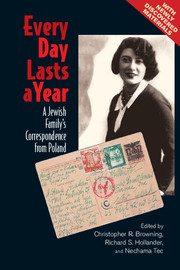Introduction and Acknowledgments
Published online by Cambridge University Press: 12 October 2009
Summary
The historian trying to write about the life and death of Polish Jewry during the Holocaust faces a major dilemma. Most of the surviving contemporary documents are those written by the Nazi perpetrators, not the victims. Not only were some 90 percent of Polish Jews murdered, most of the records of the Jewish communities as well as the personal papers, letters, and diaries of individual Polish Jews were destroyed as well. The constant uprooting of the Jewish population as well as the looting and confiscation of Jewish property that both preceded and followed their destruction were not conducive to the preservation of such precious documents. The Ringelblum Archives for Warsaw and a substantial amount of material from Lodz are the exception. There are no comparable collections of surviving Jewish documentation from other cities in Poland.
The postwar memoirs and testimonies of the survivors are, of course, one essential source for historians trying to compensate for the loss of so much contemporary documentation, but postwar memories – filtered through catastrophe and survival – cannot fully recapture the perspective and state of consciousness of an earlier period when not only was the Holocaust not yet known but for most was totally inconceivable. The rare surviving diaries and letters written after the German occupation but before the mass murder – particularly from cities other than Warsaw and Lodz – are therefore an invaluable historical resource to recreate the world of Polish Jewry on the edge of destruction.
- Type
- Chapter
- Information
- Every Day Lasts a YearA Jewish Family's Correspondence from Poland, pp. ix - xPublisher: Cambridge University PressPrint publication year: 2007



